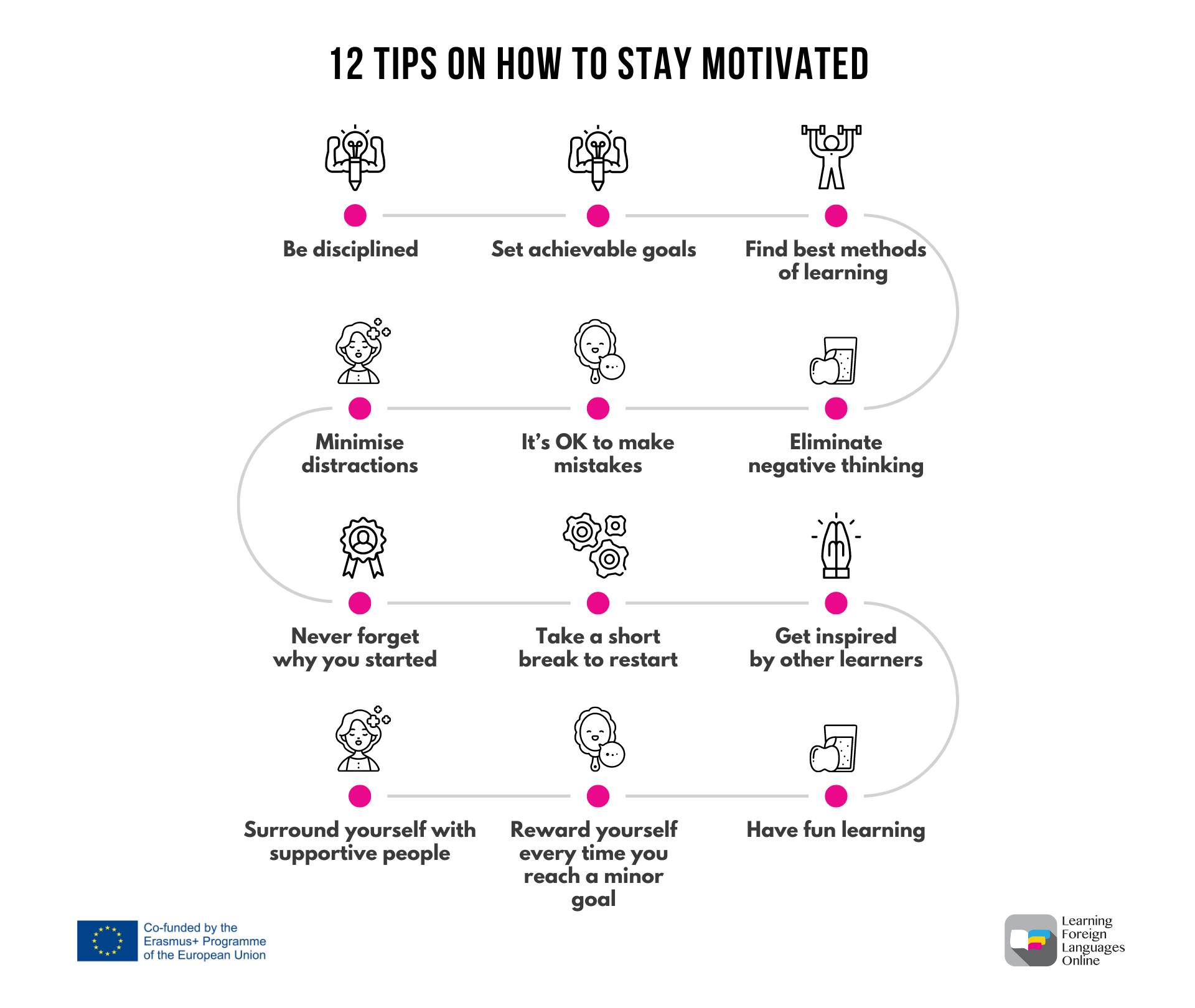
E-course
Maintaining motivation
Module 1 | Unit 9
Introduction

Motivation is strong. You’ve rolled up your sleeves. You’ve decided to begin. You know that the best way to do it, is to do it. It goes well the first few weeks, but then, after a while, we start doubting ourselves. “How am I doing? Have I learned anything? Maybe this isn’t working. I will never succeed.” It is easier to give up.
Maintaining motivation is not easy, but if you ever reach a point when you feel you have hit the wall, look at this guide and find most suitable ways to go around or jump over that wall. And if anyone else says it’s impossible, remember – it’s impossible for them, not for you.
Getting started

Tips
12 tips on how to stay motivated

1. Be disciplined
Creating your own personalised language learning routine will help you to stay disciplined and make studying easier as the time progresses. Think of a set of language learning activities and leave a certain amount of time for them in your schedule. For example, half an hour, three times per week. However, don’t stress too much if you can’t get yourself to study sometimes. Everyone has their bad days, and you can easily make up for what you’ve missed in your future sessions.
2. Set achievable goals
Think about what you can accomplish within your available time and resources. Make your goals challenging, yet realistic and achievable. An example of this is deciding to learn three new pieces of information each day, which you can achieve even on days when your motivation is low. Remember, by the end of the week you will have been closer to your goal!
Setting unrealistic goals will only demotivate you and slow down your learning process.
3. Find methods of learning that work best for you
Pay attention to language learning techniques that are right for your learning style. Don’t do something that doesn’t suit you and take notes about learning activities and materials that frustrate you or that are providing minimum results. Instead, find other activities that target the same skills and engage in those you enjoy. This will make you learn more successfully, be more motivated and have more fun.
4. Minimise distractions
Create a study space free of distractions. If you often find yourself checking your phone, rearranging your room or watching a new show when you should be studying, you should find a way to limit what’s disrupting your concentration. With fewer distractions, it’s easier to stick to your learning routine. Try switching off your mobile notifications, reward yourself with a movie after you finish work, or find another place to study, like a local library, a park or a caffe.
5. It’s OK to make mistakes
Mistakes are an essential part of the learning process. Everyone makes mistakes when faced with something new and it’s not something to be ashamed of. It is rather the fear of making mistakes that can lead to procrastination and delay further improvement. Therefore you need to accept them as a necessary part of your journey and learn how to benefit from them.
6. Eliminate negative thinking and replace it with a positive mindset
Don’t get caught up in your own negative thoughts when things get a bit rough. Learning a new language by yourself is not easy, and negative thinking can only discourage and demotivate you from achieving your long-term goals. Instead, focus on the positive and ask yourself: What am I good at? No matter how small, list the things that you’ve achieved and you’re proud of. Positive mindset goes a long way!
7. Never forget why you started in the first place
It’s easy to lose sight of your original motivation when the realities of life interfere with your plans. If that happens, try to reconnect with your initial reasons for learning a language and ask yourself: Why did you want to learn a language? What motivated you to start? No matter the reason, remembering why you started can provide you with a little boost of energy and remind you why it’s worth it.
8. Take a short break to restart
If you’re feeling overwhelmed with trying to remember all the new information, it can be useful to take a short break to restart your energy. You can try going for a walk, or doing a short exercise, which has been proven to boost your memory capacity. You can also nourish your body with a healthy snack or take a short nap. Your brain needs food and rest to process new information, so be kind to yourself!
9. Get inspired by other self-directed online learners
When you feel like you’re stuck in a rut, it can be useful to get inspired by someone who has gone through the same language learning journey. Connect with other self-directed online learners who can share their experiences, tips, and life hacks with you, or watch YouTube videos with inspiring speakers. They make great examples of what a little patience and determination can do.
10. Surround yourself with people who will support you
Experiencing something new by yourself can be quite challenging. There are many obstacles on our way; and it is easy to be unsure of ourselves and, eventually, give up. Sometimes, people that surround us do not understand how important something is for us and will try to discourage us by telling us how useless our efforts are. This is when we need to surround ourselves with people who will support us and believe that we can accomplish something and push us to reach our goals, even when we stop believing it ourselves.
11. Reward yourself every time you reach a minor goal
Rewards make for great motivators in the learning process. To keep your motivation high and keep track of your progress, celebrate every milestone you reach. Even small things, like getting a cup of good coffee or watching your favourite TV show after studying can make learning a new language easier.
12. Have fun learning
Language learning shouldn’t be monotonous. Spice up your routine by incorporating interactive learning whenever possible. Find activities you enjoy, listening to your favourite songs in the target language, watching a foreign movie without subtitles, or playing a game. Doing things that you like will make you procrastinate less and work harder towards your goal. Whatever you do, make it fun.

More resources

Still want to continue learning about the topic of this unit? Not to worry, we have made a selection of further resources that you can use if you would like to find out more. Just click on the links and keep learning!
- How to motivate yourself to learn a new language
- 3 Mindsets That Fire Up Your Motivation to Learn a Language
- How to boost your motivation to learn a language
- How to stay motivated when learning a language
- For Anyone Losing Motivation in Language Learning | Daily Language Diary 006
- Maintaining Motivation in Language Learning
Practical tasks

 Read at least two articles and watch two videos from the list. Answer the question: What technique can you apply to your learning process?
Read at least two articles and watch two videos from the list. Answer the question: What technique can you apply to your learning process?
 Set up several learning goals for your next four learning sessions. You can do this on your wall or on a piece of paper, use post-it notes to write your goals. Make two columns: one for what you want to learn, and another for what you have successfully learned. Every time you achieve a new goal, move the paper from “Set” column, to the “Achieved” column.
Set up several learning goals for your next four learning sessions. You can do this on your wall or on a piece of paper, use post-it notes to write your goals. Make two columns: one for what you want to learn, and another for what you have successfully learned. Every time you achieve a new goal, move the paper from “Set” column, to the “Achieved” column.
This way you always have in front of you everything you have achieved so far and you can see how much progress you have already made. This will help you not to focus on the work you still have to do but to be proud of yourself for everything you have already done.
 Write down why it is important for you to learn your target language and write at least three things that will change in your life after you have learned this language or improved your knowledge of it.
Write down why it is important for you to learn your target language and write at least three things that will change in your life after you have learned this language or improved your knowledge of it.
Make a list of things you’re good at and your achievements in life. Think about small things like cooking or drawing, but also about big achievements like getting a college diploma or a job you love. Go back to this list every time you start to feel demotivated.
![]() Write phrases and quotes that motivate you. Put them in visible places, your bathroom mirror, the fridge, close to your laptop or computer.
Write phrases and quotes that motivate you. Put them in visible places, your bathroom mirror, the fridge, close to your laptop or computer.
 Decide ways in which you will reward yourself after you have achieved your goals before you start working on them. Write them down. Use small rewards for small goals (call your friend after you have finished your learning for the day or take a piece of chocolate) and big rewards for big goals (go to the cinema or a concert after having completed ten small goals).
Decide ways in which you will reward yourself after you have achieved your goals before you start working on them. Write them down. Use small rewards for small goals (call your friend after you have finished your learning for the day or take a piece of chocolate) and big rewards for big goals (go to the cinema or a concert after having completed ten small goals).
Unit test

